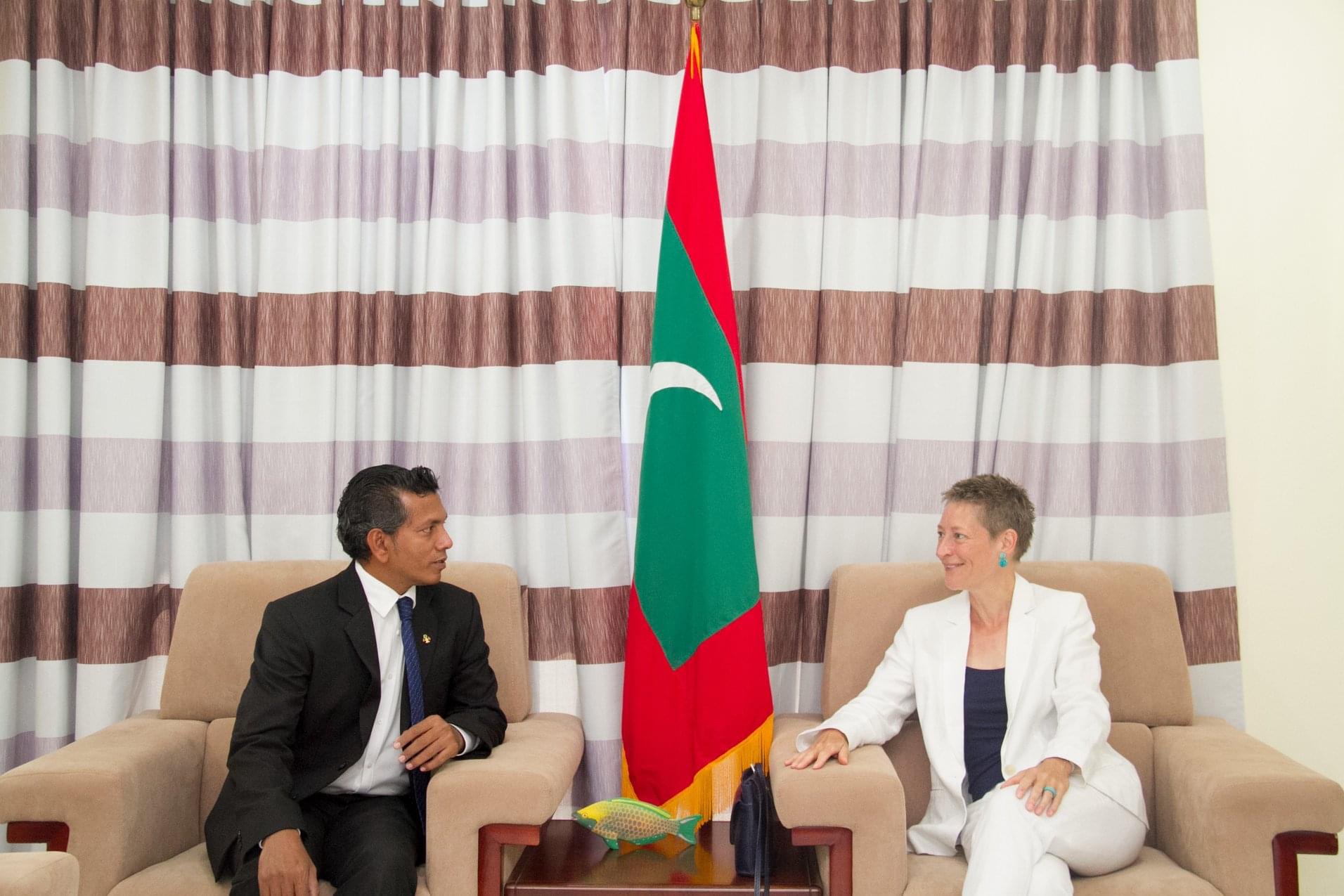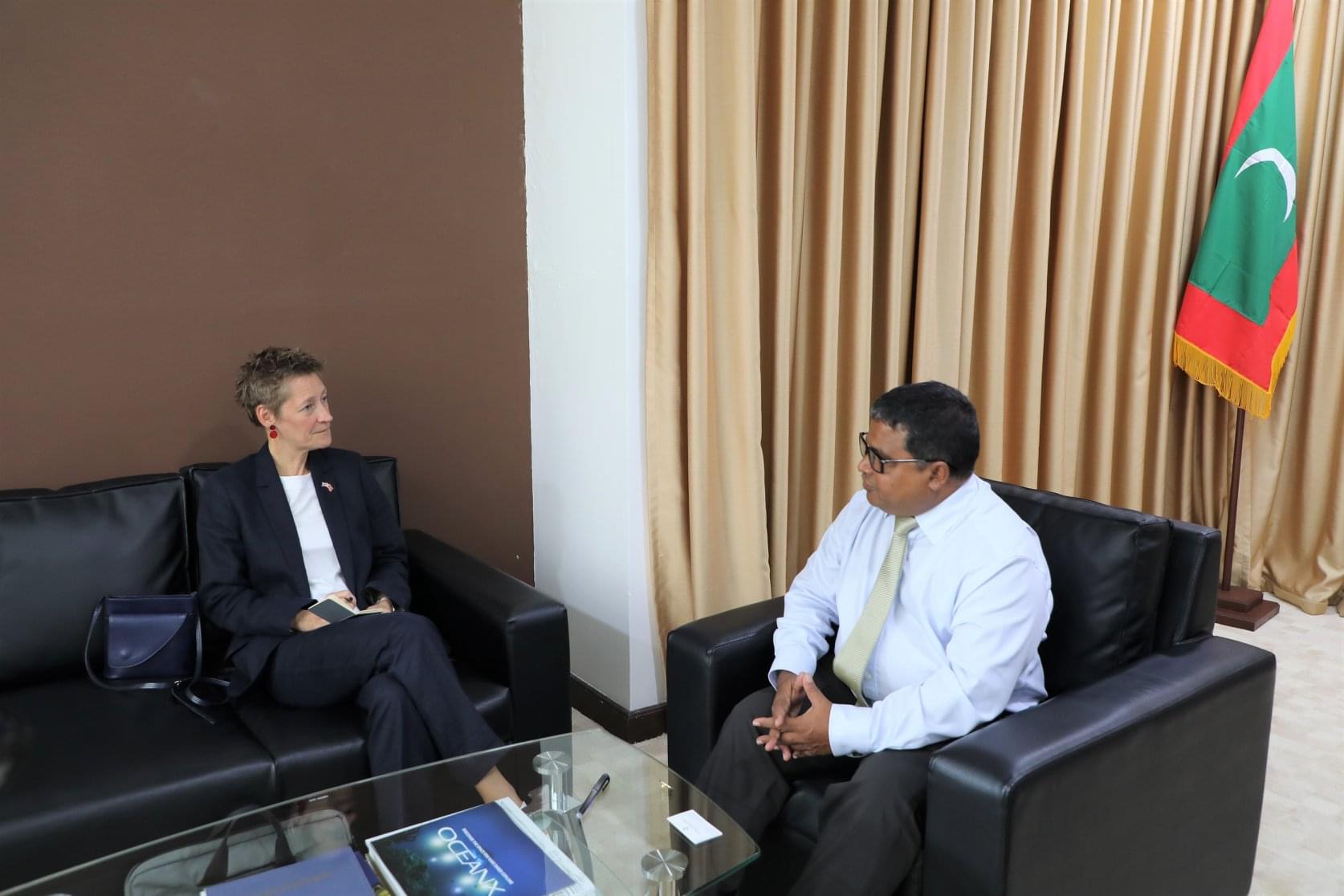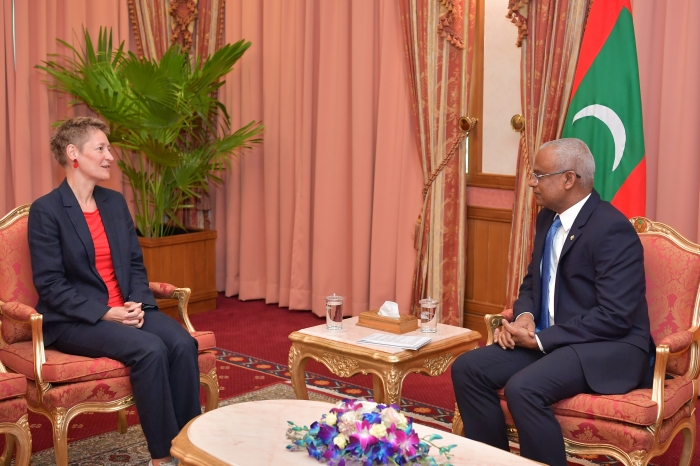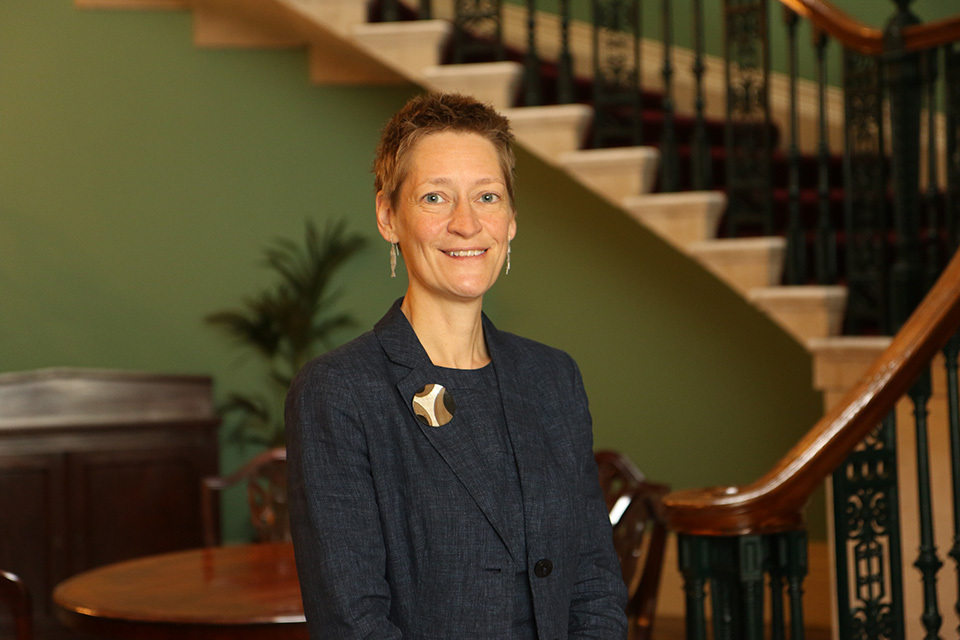On 4th December 2018, the Foreign Secretary for the United Kingdom’s (UK), Jeremy Hunt announced the establishment of a British Embassy in the Maldives. On 25th July, 2019, Ms Caron Röhsler was appointed as Her Majesty’s Ambassador to the Republic of Maldives, to lead the newly formed Embassy’s team in Male’, the capital of Maldives.
Ms. Röhsler succeeded Mr. James Dauris, who has since been transferred to another Diplomatic Service appointment, and took up her appointment as the British High Commissioner to the Maldives on 30th October, 2019. Today marks exactly one year since Ms. Röhsler officially took office, and here is what she had to say about her time in the Maldives so far.
How will you be celebrating one year in the Maldives?
It would have been nice to have a reception, but Covid has really cramped our style in year one. Hopefully, when we’re ready to move into our permanent office in Male’, we’ll be able to have a physical get-together then – but I imagine we may still be observing covid restrictions for some time, until a vaccine is distributed. I really miss the receptions and events side of diplomacy. People sometimes think it’s just partying for fun. The best events are fun, of course! But we are social beings and receptions are an important way of cementing relationships, forging new links, meeting people you might not have an hour-long meeting with but with whom you can exchange views, and just catch up on what’s new. I hope we can get back to that eventually.

How would you describe the past year in Maldives?
I think ‘eventful’ would cover it! It has been pretty non-stop. But also very rewarding: with so much to do, there was progress of some kind every day – even if not publicly visible. The thrill of exploring a new country and seeing a different way of life never wears off for me. November was all about Male’ and Hulhumale’ and meeting lots of people (and drinking lots of good coffee!). December was my first visit outside Male’ Atoll, to Addu – which was wonderful; I’m so glad I at least managed to go there before our movements were restricted. January was team recruitment. February and March was when most of the team started work. Then March to May we were in the throes of the covid response, helping British (and other) Nationals, helping non-resident diplomatic colleagues to understand developments, and reporting to London. It was a very busy time, in ‘crisis mode’, and impressive to see the all-local team get to grips with everything. We took on two more staff in May and August, reflecting our growing commitments to climate change and security work. In fact our staff has more than doubled from what was originally planned. There has also been a lot of work going on behind the scenes to develop our bilateral support to Maldives, which will become more evident in year two. Of course, what didn’t happen was the opening of our physical office. We have an excellent location, on the Male’ waterfront, but can’t open until works are complete. Now we have the UK-Maldives travel corridor in place, we can get back to work on that.
What positive changes do you wish to see in the country?
The first thing to say is that I’ve seen a lot of positive change already. Maldives being re-admitted to the Commonwealth in February was a testament to the progress made in respect for human rights and democratic norms that are criteria for Commonwealth membership. Since then, the government has made several important commitments on human rights, and signed up to the Commonwealth Blue Charter and Clean Oceans Alliance. Covid was an unexpected problem that the country had to face, along with the rest of the world, but it has shown how much can be mobilised and achieved when the efforts of many people and organisations are aligned to a common cause.
With that in mind, what I most hope to see in future is: environmental protection and nature/biodiversity at the heart of a strong economic recovery. Development does not have to be either/or: it can be both if Maldives adopts a Blue Economy approach. In fact I would say the environment must be seen as Maldives’ most precious asset, and recognised as such, internationally – including financially. I’d like to see Maldives reject single use plastics and switching to renewable energy faster. Commitments have been made but I think there needs to be a greater sense of urgency. And I hope civil society groups and NGOs of all kinds will find their points of view listened to, and discussed, in an atmosphere of tolerance and respect.

How do you reckon the bilateral bond between both countries can be improved in the future?
There are many ways the UK and Maldives already connects. British educational links are strong, for example. And the Maldives HC to the UK and I are both keen to see people-to-people Commonwealth links grow. There are over 80 accredited associations that connect professionals, and others with common experience/interests (e.g. youth), with similar people throughout the Commonwealth. This can be a great source of professional and moral support, as well as action for change. There’s a database of groups here: https://thecommonwealth.org/organisation-directory
Probably our busiest area of collaboration in the coming year will be working together (not only government but with NGOs, I hope) on climate change as the UK hosts the COP26 climate negotiations. It’s not just a meeting in November in Glasgow: there will be a ‘Year of Climate Action’ and we’re only just starting on that. We already have a well-developed relationship on security co-operation and I hope this will grow. I see a lot of potential for scientific collaboration on innovative solutions in the marine environment, and am much looking forward to the rescheduling of the Nekton Mission (to explore sea mounts in the south) in 2021. It’s also clear that business and trade links could be significantly improved, and I want to understand what the opportunities are and how we can connect up businesses, imports/exports and investors in both countries.

What has UK in Maldives done so far in assisting Maldives with the Covid-19 pandemic and what are the future plans?
We’re all delighted to see travel links restored between UK and Maldives, with the resumption of BA direct flights for the high season, and Maldives now part of the ‘travel corridor’. The UK’s main contribution to the global covid response, that will benefit Maldives, has focused on the global strategic recovery from this pandemic. There are three main areas: 1) leading research to develop a vaccine through the Oxford Vaccine Group; 2) major and longstanding support for Gavi (the Global Alliance for Vaccines and Immunisation) and our diplomatic efforts, through the WHO, to ensure that a vaccine will be readily available globally; and 3) using our position in the G20 and International Financial Institutions to ensure debt relief and other forms of macro-economic support to vulnerable economies, notably Small Island States like Maldives.
To me, this ‘Global Britain’ means: we invest time and expertise in our bilateral relationships (it was at the behest of Boris Johnson, when he was Foreign Secretary, that we opened 12 new overseas posts including the BHC in Maldives) and we focus a significant proportion of our financial resources and diplomatic influence on global strategic and multilateral initiatives where collective action can have a greater, and more lasting, impact than acting unilaterally or bilaterally.
What are the future plans of the HC in Maldives?
After a busy set-up year, the coming one will see us establish some really exciting programmes of work supporting democratic institutions, engaging on climate change, building our security co-operation. How active we can be will of course depend on covid limitations. While we wait for things to improve, we will also be trying out innovative diplomacy like “virtual visits”. There are many other smaller initiatives running alongside these big pieces of our work, like our annual Chevening programme. We’ll be getting a Chevening Alumni Group going in the coming year, and are very keen to trace all our “Cheveners” so we can work with them more closely.
Personally, I’m desperate to get out and explore Maldives! I’ve been in the capital without leaving since February. And, while I’m sure the resorts are all lovely, it’s the “real Maldives” I want to see and experience. Much of that “real Maldives” is under water. I need to brush up on my diving skills and meet the marine inhabitants. Can you believe, I’ve been here a year and I’ve never seen a dolphin, a whale shark or a manta ray?!
Editor’s note: On behalf of team ‘Times of Addu’, we wish High Commissioner Caron Röhsler and her team, happy celebrations and success with all future plans.





